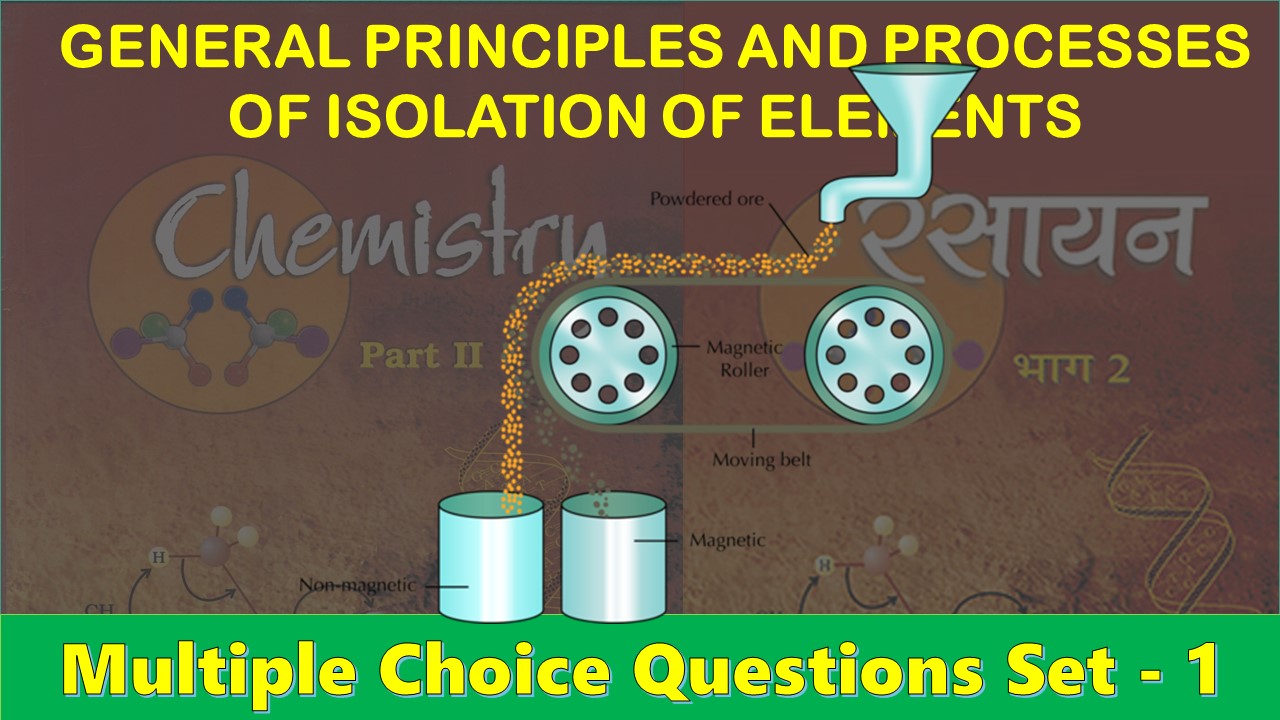CBSE Class 12 General Principles and Processes of Isolation of Elements Multiple Choice Questions with Answers. MCQ Questions Class 12 General Principles and Processes of Isolation of Elements with Answers Is Prepared Based on Latest Exam Pattern. Students can solve NCERT Class 12 General Principles and Processes of Isolation of Elements MCQs with Answers to know their preparation level.
Students who are searching for NCERT MCQ Questions for Class 12 General Principles and Processes of Isolation of Elements with Answers are compiled here to get good practice on all fundamentals. Know your preparation level on MCQ Questions for Class 12 General Principles and Processes of Isolation of Elements with Answers. You can also verify your answers from our provided MCQ Class 12 General Principles and Processes of Isolation of Elements with Answers. So, ace up your preparation with MCQ of Class 12 Chemistry Examinations.
MCQ Questions Class 12 General Principles and Processes of Isolation of Elements with Answers - Set -
Question 1:
The metal oxide which cannot be reduced to metal by carbon is
(a) Al2O3
(b) PbO
(c) ZnO
(d) Fe2O3
Correct Answer – (A)
Question 2 :
Considering Ellingham diagram, which of the following metals can be used to reduce alumina?
(a) Fe
(b) Zn
(c) Mg
(d) Cu
Correct Answer – (C)
Question 3 :
Sulphide ores of metals are usually concentrated by froth floatation process. Which one of the following sulphide ores offer an exception and is concentrated by chemical leaching?
(a) Galena
(b) Copper pyrite
(c) Sphalerite
(d) Argentite
Correct Answer – (D)
Question 4 :
Which one of the following is a mineral of iron?
(a) Malachite
(b) Cassiterite
(c) Pyrolusite
(d) Magnetite
Correct Answer – (D)
Question 5 :
Identify the incorrect statement.
(a) The scientific and technological process used for isolation of the metal from its ore is known as metallurgy.
(b) Minerals are naturally occurring chemical substances in the earth’s crust.
(c) Ores are minerals that may contain a metal.
(d) Gangue is an ore contaminated with undesired materials.
Correct Answer – (D)
MCQ Questions Class 12 General Principles and Processes of Isolation of Elements with Answers
Question 6:
In the extraction of copper from its sulphide ore, the metal is finally obtained by the reduction of cuprous oxide with
(a) carbon monoxide
(b) copper (I) sulphide
(c) sulphur dioxide
(d) iron (II) sulphide.
Correct Answer – (B)
Question 7:
Roasting of sulphides gives the gas X as a byproduct.
This is a colourless gas with choking smell of burnt sulphur and causes great damage to respiratory organs as a result of acid rain. Its aqueous solution is acidic, acts as a reducing agent and its acid has never been isolated. The gas X is
(a) CO2
(b) SO3
(c) H2S
(d) SO2
Correct Answer – (D)
Question 9:
“Metals are usually not found as nitrates in their ores.” Out of the following two (I and II) reasons which is/are true for the above observation?
I. Metal nitrates are highly unstable.
II. Metal nitrates are highly soluble in water.
(a) I is false but II is true.
(b) I is true but II is false.
(c) I and II are true.
(d) I and II are false
Correct Answer – (A)
Question 10:
Which one is malachite from the following?
(a) CuCO3.Cu(OH)2
(b) CuFeS2
(c) Cu(OH)2
(d) Fe3O4
Correct Answer – (A)
- NCERT Solutions Class 11 Chemistry Chapter 1 : Some Basic Concepts of Chemistry
- NCERT Solutions Class 11 Chemistry Chapter 2 : Structure Of The Atom
- NCERT Solutions Class 11 Chemistry Chapter 3 : Classification of Elements and Periodicity in Properties
- NCERT Solutions Class 11 Chemistry Chapter 4 : Chemical Bonding and Molecular Structure
- NCERT Solutions Class 11 Chemistry Chapter 5 : States of Matter
- NCERT Solutions Class 11 Chemistry Chapter 6 : Thermodynamics
- NCERT Solutions Class 11 Chemistry Chapter 7 : Equilibrium
- NCERT Solutions Class 11 Chemistry Chapter 8 : Redox Reactions
- NCERT Solutions Class 11 Chemistry Chapter 9 : Hydrogen
- NCERT Solutions Class 11 Chemistry Chapter 10 : The s-Block Elements
- NCERT Solutions Class 11 Chemistry Chapter 11 : The p-Block Elements
- NCERT Solutions Class 11 Chemistry Chapter 12 : Organic Chemistry: Some Basic Principles and Techniques
- NCERT Solutions Class 11 Chemistry Chapter 13 : Hydrocarbons
- NCERT Solutions Class 11 Chemistry Chapter 14 : Environmental Chemistry



